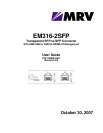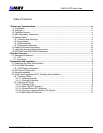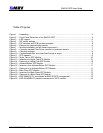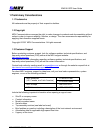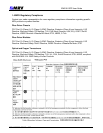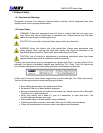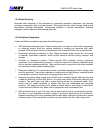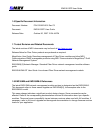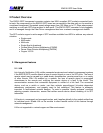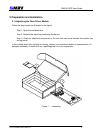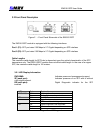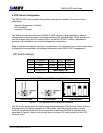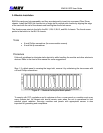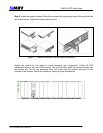
EM316-2SFP User Guide
P/N 1259003-001 Rev C3 vii
1.5.3 Static Electricity
Eliminate static electricity in the workplace by grounding operators, equipment, and devices
including components and computer boards. Grounding prevents static charge buildup and
electrostatic potential differences. Transporting products in special electrostatic shielding
packages reduces electrical field damage potential.
1.5.4 Workplace Preparation
A safe and effective workplace provides the following items.
• ESD protective clothing/smocks: Street clothing must not come in contact with components
or computer boards since the various materials in clothing can generate high static
charges. ESD protective smocks, manufactured with conductive fibers, are recommended.
• Electrostatic shielding containers or totes: These containers (bags, boxes, etc.) are made
of specially formulated materials, which protect sensitive devices during transport and
storage.
• Antistatic or dissipative carriers: These provide ESD protection during component
movement in the manufacturing process. It must be noted that antistatic materials alone
will not provide complete protection. They must be used in conjunction with other methods
such as totes or electrostatic shielding bags.
• Dissipative tablemat: The mat should provide a controlled discharge of static voltages and
must be grounded. The surface resistance is designed such that sliding a computer board
or component across its surface will not generate more than 100 V.
• Operator grounding: Keep a wrist strap or ESD cuff in constant contact with bare skin with
a cable for attaching it to the ESD ground. The wrist strap drains off the static charge of the
operator. The wrist strap cord has a current-limiting resistor for personnel safety. Wrist
straps must be tested frequently to ensure that they are undamaged and operating
correctly. Use special grounding heel straps or shoes when a wrist strap is impractical.
These items are effective only when used in conjunction with a dissipative floor.
• ESD protective floor or mat: The mat must be grounded through a current-limiting resistor.
The floor or mat dissipates the static charge of personnel approaching the workbench.
Special conductive tile or floor treatment can be used when mats are not practical or cause
a safety hazard. Chairs should be conductive or grounded to the floor with a drag chain.



